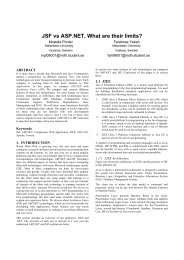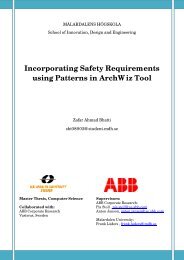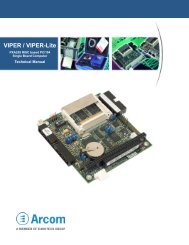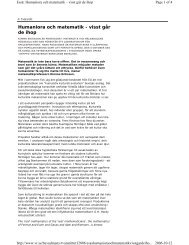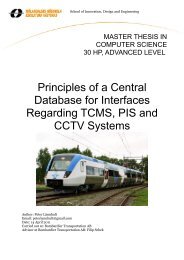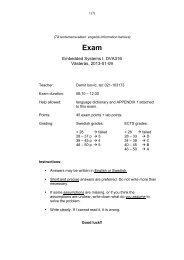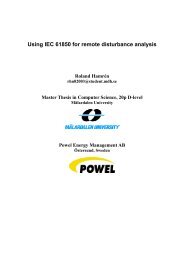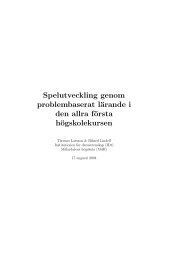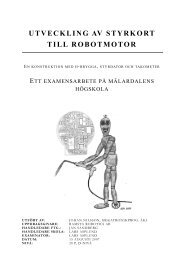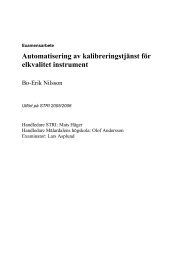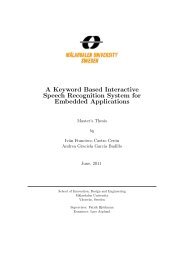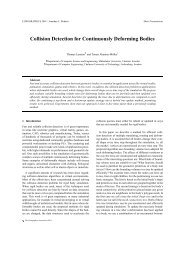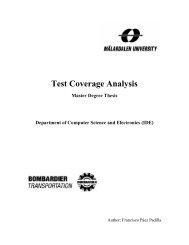CoDeSys on CCP XS for Bromma Conquip - Research
CoDeSys on CCP XS for Bromma Conquip - Research
CoDeSys on CCP XS for Bromma Conquip - Research
- No tags were found...
Create successful ePaper yourself
Turn your PDF publications into a flip-book with our unique Google optimized e-Paper software.
Student<br />
Joel Ek<br />
Supervisor at CC-Systems<br />
Fredrik Löwenhielm<br />
Dok Nr<br />
1.0<br />
Date<br />
2006-08-08<br />
Rev<br />
PA1<br />
Säk klass<br />
F<br />
Filname<br />
Thesis.doc<br />
CODESYS ON <strong>CCP</strong> <strong>XS</strong> FOR BROMMA CONQUIP<br />
is worth it in respect to per<strong>for</strong>mance.<br />
6.1 Per<strong>for</strong>mance Test<br />
During the test a number of per<strong>for</strong>mance data was collected. These data was more a c<strong>on</strong>trol that<br />
the system actually is per<strong>for</strong>ming as expected, the <strong>CCP</strong> <strong>XS</strong> is more powerful than the master<br />
used <strong>on</strong> the spreader today so instead of a comparis<strong>on</strong> between the systems it is more an<br />
insurance that the system is per<strong>for</strong>ming according to expectati<strong>on</strong>s.<br />
The data that was of most interest to us was the cycle time <strong>for</strong> the comp<strong>on</strong>ent, the APS was<br />
chosen <strong>for</strong> the test because it is close to overloading the system when it is in use today. So if this<br />
comp<strong>on</strong>ent per<strong>for</strong>ms well in the new envir<strong>on</strong>ment then <strong>Bromma</strong>'s other comp<strong>on</strong>ents most likely<br />
will too.<br />
Table 2<br />
APS RUNNING IDLE<br />
min average max min average max<br />
1. SCS2<br />
(16MHz)<br />
2. <strong>CCP</strong> <strong>XS</strong><br />
(533MHz)<br />
3. <strong>CCP</strong> <strong>XS</strong><br />
(533MHz)<br />
38ms 39ms 48ms - - -<br />
96µs 118µs 138µs 71µs 92µs 117µs<br />
115µs 150µs 171µs 85µs 110µs 128µs<br />
1. The current system loaded with the APS and during a simulati<strong>on</strong> going to different positi<strong>on</strong>s.<br />
2. The <strong>CCP</strong> <strong>XS</strong> loaded with the APS and cycle time recorded both when going to a positi<strong>on</strong> (running) and<br />
while waiting(idle)<br />
3. The <strong>CCP</strong> <strong>XS</strong> loaded with a modified APS that is more general in handling different number of ports,<br />
discussed in secti<strong>on</strong> 6.1.5<br />
As seen in table 2 we didn’t make any recording of values <strong>for</strong> the old system at idle mode, this<br />
was due to the fact that the SCS2 system <strong>on</strong>ly gave us cycle time in<strong>for</strong>mati<strong>on</strong> twice every hour.<br />
And when we ran out of time we decided to test it while running.<br />
The result is positive with the per<strong>for</strong>mance <strong>for</strong> the APS being up to 300 times faster: 0,118 ms<br />
<strong>for</strong> the <strong>CCP</strong> <strong>XS</strong> compared to 39 ms in the current system.<br />
The result is due to the faster and more modern CPU 20 in the <strong>CCP</strong> <strong>XS</strong>. Only the CPU speed is 30<br />
times faster: 533 MHz compared to 16 MHz. Further reas<strong>on</strong>s <strong>for</strong> the low cycle time is probably<br />
that the newer CPU is equipped larger cache memories and use pipelining in the processor might<br />
lead to lower cycle time [25, 26, 27].<br />
We also per<strong>for</strong>med a test to see if the soluti<strong>on</strong> <strong>for</strong> the parameter setting altered the cycle time in<br />
20<br />
The <strong>CCP</strong> <strong>XS</strong> use an Intel Xscale processor (533 MHz, 32+32 KB instructi<strong>on</strong> and data cache, 133 MHZ bus speed)<br />
The SCS 2 use a Motorola 68332 processor (16 MHz, 2KB static ram, 16 MHz bus speed)<br />
44 (55)



